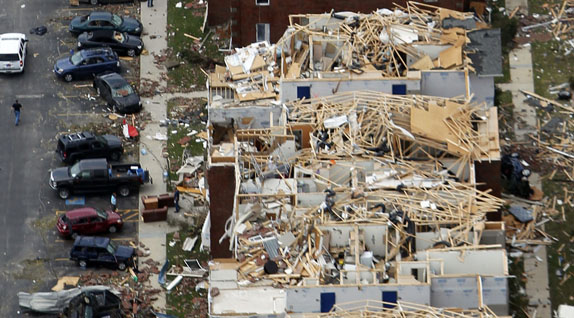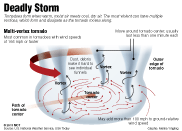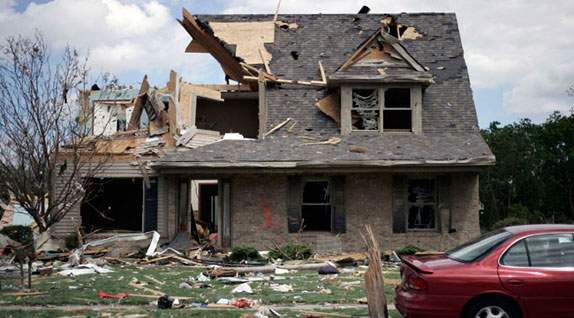 Keith Myers/Kansas City Star/MCT
Keith Myers/Kansas City Star/MCT
Complete destruction: An aerial view of the city of Joplin, Missouri, shows the extent of damage caused by a tornado that recently hit the area (May 24, 2011).
Tornado swarms, massive floods, record-setting droughts—why such volatile weather?
Subscribe to the Real Truth for FREE news and analysis.
Subscribe NowResidents heard warning sirens and watched televised weather reports of powerful storms forming in the late afternoon. By 5:40 p.m., blustery winds and precipitation began dropping as much as nine inches of rain. Then, partly disguised by explosively loud thunder and baseball-sized hail, a colossal funnel more than a mile wide appeared in downtown Joplin, Missouri. In some cases, people had just 20 minutes to find a safe place to hide.
When residents heard the whirlwind’s deafening train-like noise, confusion erupted. Shoppers inside a nearby superstore began desperately running, crashing shopping carts against each other, scrambling to exit. Store managers tried to get as many people as possible away from the doors.
Others watching the funnel bear down on the city had only one thing in mind: seek shelter. Neighbors crammed into basements and bathrooms, piling on top of one another to escape the fierce winds. Amid crushing sounds and screams of fear, people recited prayers, and cried out to God to help them.
Some did not listen to the initial reports, preferring instead to wait until they could actually see the funnel bearing down on their homes. As the deadly twister swirled nearer, the fascination of those recording the event on cellphones turned to horror. Debris that once appeared as tiny specks in the air flew by like 10-foot, 100-mile-an-hour bullets. By the time they sought shelter, the storm’s fury was upon them—and it was too late.

Far worse than anyone ever imagined, an EF5 multi-vortex tornado (several twisters within one main tornado) with 200-mile-per-hour winds demolished up to 75 percent of Joplin. More than 150 people fell prey to the worst twister to hit the area in 60 years. Trees were uprooted, cellphone towers knocked over, cars tossed on top of each other, and roofs ripped off. Once-thriving neighborhoods were unrecognizable. In a matter of minutes, 8,000 homes and businesses were damaged. Joplin was flattened—a city laid waste.
The superstore’s roof was sucked away and its support beams collapsed, crushing several people. In the parking lot, a telephone pole split in half, and a car was wrapped around it. Some who had waited outside in their vehicles for the storm to pass were killed where they sat.
Of the town’s 50,000 people, most sought safety and their lives were spared. Others, though, could not hide from the violent twister that demolished their manmade shelters.
Yet Joplin was not the only town wiped out by tornadoes in 2011. The Missouri funnel—which caused the most twister-related deaths in a single day in United States history—was just one of many to hit towns across the country during one of the deadliest tornado outbreaks in decades. In May, an estimated 370 tornadoes struck the Midwest, while April experienced a record 800 twisters.
“No question about it: this has been a wild weather year so far in the United States, with record rains, droughts, wildfires and tornadoes,” Reuters reported.
Across the country, abnormally devastating weather, deadlier storms, multi-state flooding, excessive drought, and harder-to-control fires are wreaking havoc on the economy and the lives of millions of people.
Why such violent weather?
While meteorologists can explain the physical conditions necessary for inclement weather, they are incapable of pinpointing the exact reason why such weather occurs. For instance, they are able to recognize the principle of angular momentum—sudden concentration of mass near a rotating object’s axis, which produces an explosive spinning effect at work in a tornado—but not why it occurs.
“If a draft of air from [a] storm comes along close to the ground and then moves upwards (called an ‘up-draft’), it will pull the spinning air upwards,” a University of Pennsylvania physics professor described. “Now comes the part that we don’t understand quite as well. So far the spinning air is still really really wide. It then gets pulled in really tight so that it makes a tornado in the same way as a figure skater pulls in his/her arms during a spin to spin faster. Scientists aren’t exactly sure why this reduction in width happens sometimes but not at other times, but, when it does, wind speeds can go from the 30-40 mph winds of a regular storm to over 300 mi/hour.”
An understanding of basic physics, coupled with advanced monitoring of changes in wind direction, can give scientists a clear picture of when conditions are ripe for a twister. While such information can be helpful in better appreciating the nature and composition of such violent wind rotations, experts cannot guarantee their path or, in Joplin’s case, predict if one will become a multi-vortex tornado. It is only by watching video reports and hearing testimonies of those involved after the fact that such details can be analyzed.
From ancient times, people have turned to spiritual explanations to understand the weather. This has led them to take extreme measures, including human sacrifice, to appease supposed higher powers they feel control the environment. Yet the worship of these has still left man without the answers he seeks.
Thousands of years before today’s meteorological advancements, the Bible had much to say about weather. Psalm 135 states: “He [God] causes the vapors to ascend from the ends of the earth; He makes lightnings for the rain; He brings the wind out of His treasuries” (vs. 7).
Notice that this verse reveals the water (hydrologic) cycle process (which includes evaporation, cloud formation and precipitation) thousands of years prior to its discovery by scientists.
King Solomon’s God-given wisdom allowed him to understand the complexity of Earth’s wind currents: “The wind goes toward the south, and turns about unto the north; it whirls about continually, and the wind returns again according to his circuits” (Ecc. 1:6). Meteorologists were not able to fully explain these wind circuits until the 1800s!
The next verse in this passage expands on the global water pattern: “All the rivers run into the sea; yet the sea is not full; unto the place from whence the rivers come…they return again” (vs. 7).
The Moffatt translation of Ecclesiastes 1 verses 6 and 7 is even clearer: “From south to north the wind blows round, the wind turns as it blows, turning and then returning on its track. The streams all flow into the sea, but the sea they never fill, though the streams are flowing still.”
If mankind would stop neglecting the wealth of knowledge revealed only in God’s Word, then it would finally begin to understand the wild weather it has been unable to comprehend for centuries—and the God who created it.
In addition to scientific processes, the Bible reveals that weather events include time and chance (Ecc. 9:11). Notice what Jesus said in Matthew 5: “[God] makes His sun to rise on the evil and on the good, and sends rain on the just and on the unjust” (vs. 45).
Most weather throughout man’s history has been the result of automatic scientific processes. When a farmer has too much or too little rain, it is generally due to normal shifts in weather. Yet this fact does not mean such weather can be ignored—God does use weather to fulfill His purpose.
Later in the book of Matthew, Jesus stated that natural disasters would increase and intensify in what are called the “last days.” The recent tornado swarm in May 2011 is just one example of this.
Ask: when have 800 tornadoes occurred in a month?
Weather upsets are just one condition that will increase in the last days. Matthew 24:7 states: “For nation shall rise against nation, and kingdom against kingdom: and there shall be famines, and pestilences, and earthquakes, in diverse places.”
Christ specifically warned that weather-related calamities would be only one part of the beginning of a succession of events that would overwhelm humanity—including some of the most affluent Western nations. Notice He mentions “famines, and pestilences, and earthquakes.”
Certainly, given today’s headlines, a far-worse proverbial “perfect storm”—compounding weather catastrophes, followed by famine and disease—now looms. A plethora of weather calamities—record floods in the Midwestern U.S., Australia and China, increasingly violent hurricanes and typhoons in uncommon locations, massive dust storms, and crop-eradicating droughts and forest fires—have been occurring. This will ultimately result in increased pest infestation, wild animals looking for alternate food sources, and severe famine worldwide.
A sobering example of worsening problems tied to such weather anomalies was reported by Reuters: “Recent flooding in southern and eastern Arkansas has displaced turtles from their normal habitat in the canals, swamps and low-lying areas near the rice fields, and driven them to seek shelter in the ditches next to the crops.”
The media outlet said the turtles damage crops. It added that is a problem because “Arkansas crops account for about 48 percent of U.S. rice production, according to the Arkansas Rice Federation. The state is the world’s third-largest exporter of the grain.”
Later, the article states, “The turtles are only the latest concern for rice farmers. Agricultural experts estimated the floods could stifle as much as 10 percent of rice planting in Arkansas this year. Arkansas rice farmers have battled both flooding and drought this year in various parts of the state. Some farmers in eastern Arkansas near the Mississippi River have lost more than 2,000 acres of rice.”
According to U.S. National Drought Mitigation Center data for the state of Texas, “Through June 27, Del Rio had the driest October to June in the 1906-2011 record, San Antonio had the second driest October-June in a period of record beginning in 1871, and Austin Mabry was third driest for October-June in records going back to 1856.”
The data further showed, “For Texas, 80 percent or more of the pasture and rangeland was rated in poor or very poor condition, and half or more of the winter wheat, corn, soybeans, cotton, peanuts, and oat crops were rated poor or very poor.”
Increasingly turbulent natural disasters will bring food shortages, disease—and death!
Throughout the centuries, God has protected or punished His people by controlling and guiding the weather. This is the spiritual element that mankind fails to understand. When His people please Him, He uses weather to bless, protect and save them. When their ways displease Him, He uses the elements to get their attention.
Recall Psalm 135:7: “…He brings the wind out of His treasuries.” Examining the Hebrew meaning for treasuries shows this word can also mean armory. God intends weather be a blessing, yet if necessary, He uses it as a punishing weapon against those who oppose Him (Amos 4:7).
While this may sound harsh, God is loving and merciful. He wants us to enjoy the good things of life. But He understands that in order for people to do so, they must obey the laws He created, as following their own ways leads to destruction and every kind of evil now evident in the world.
Consider that cities are now filled with hatred, poverty, violence, riots, crime, pornography and pollution—a result of man turning from God. Their inhabitants do not know how to live the give way of life—a way that produces happiness and peace. Instead, they constantly focus on covetousness, desiring the latest gadget or eagerly trampling others to pursue their own success.
Living this way—the way of get—runs contrary to God’s command for all people to “live peaceably with all men” (Rom. 12:18), and most often results in the breaking of one or more of the first set of basic laws God required man to keep since the Creation of the world—the Ten Commandments.
While weather conditions will worsen, mankind is still in the proverbial “quiet before the storm.” Just as a watchful town sets emergency systems in place to warn of imminent danger, God is now using severe weather and its aftermath—floods, mildew, plagues, drought, famine—to serve as a wake-up call for mankind to return to Him.
The prophet Isaiah warned that the only way to escape what is to come is to seek God before the most devastating conditions arrive: “Seek you the Lord while He may be found, call you upon Him while He is near: let the wicked forsake his way, and the unrighteous man his thoughts: and let him return unto the Lord, and He will have mercy upon him; and to our God, for He will abundantly pardon” (55:6-7).
Allow the front edge of end-time events to awaken you to the reality of what is coming. God commands you to seek Him “while He may be found.” This means there will be a time when people will attempt to draw near to God as a last resort, but He will not be available to them.
While literal food shortages will soon plague nations of the earth, another famine will also strike. Notice: “Behold, the days come, says the Lord God, that I will send a famine in the land, not a famine of bread, nor a thirst for water, but of hearing the words of the Lord …” (Amos 8:11).
Many hear God’s warnings and do nothing. Others hear them and think they do not apply because Christ has “done away” with the Law and the punishment that comes from breaking it. Still others think that they can wait until the last minute to seek God.
Do not let any of these describe you!
Heed the words of Christ: “…why call you Me, Lord, Lord, and do not the things which I say? Whosoever comes to Me, and hears My sayings, and does them…He is like a man which built a house, and digged deep, and laid the foundation on a rock: and when the flood arose, the stream beat vehemently upon that house, and could not shake it: for it was founded upon a rock. But he that hears, and does not, is like a man that without a foundation built a house upon the earth; against which the stream did beat vehemently, and immediately it fell; and the ruin of that house was great” (Luke 6:46-49).
During times of disaster, many people die for lack of prevention, often out of plain ignorance of impending danger. Do not wait to seek shelter when the shutters are flapping, debris is shattering windows, ceilings are collapsing, power lines are down, ambulances are sounding, and a tornado is directly in front of your home. Rather, strive to be like those who looked outside their windows, watched the storm clouds brewing, believed the weather forecaster’s reports, and took immediate shelter in a place they were certain to be safe.
Now is the time to seek protection by doing what God prescribes. Consider: “A prudent man foresees the evil, and hides himself: but the simple pass on, and are punished” (Prov. 22:3).
Allow each news report of wild weather to hit home. Seek the true God now “while He may be found.” Both hear and obey His words now, before the storm of world events crashes into an unsuspecting populace.
Do not wait until the storm is at your door!
(To learn much more about prophesied weather patterns, read our comprehensive report What’s Wrong With the Weather?)
 What’s Wrong with the Weather?
What’s Wrong with the Weather?